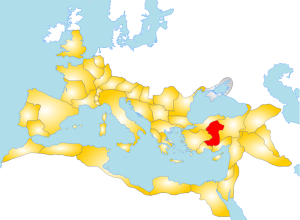This is a postscript to my recent post The Circumcising Gnostics . . . in Galatia. For what it’s worth I quote a section from a more recent (1996) work on Gnosticism, Princeton University Press’s Rethinking “Gnosticism”: An Argument for Dismantling a Dubious Category by Michael Allen Williams.
Elsewhere, Hippolytus’s use of the term gnostikos is quite ambiguous. It is possible that at one point he applies it both to the teacher Cerinthus and to the “Ebionites.” This is worthy of special note because the Ebionites, at least, are virtually never included in the modern category “gnosticism.”
Speaking of Theodotus of Byzantium, a second-century C.E. Christian, Hippolytus says that this teacher was in partial agreement with those belonging to the true church, in that Theodotus confessed that all things were created by God. On the other hand, “borrowing from the school of the gnostics and Cerinthus and Ebion,” Theodotus claims that “Christ had appeared in a certain manner, and that Jesus was a human born from a virgin by the will of the Father” (Ref. 7. 35.1-2).
Now one reading of this would be that Hippolytus has in fact distinguished Cerinthus and Ebionites from the “gnostics,” though the problem then would be identifying the “gnostics” to whom he refers. The similarity between the alleged doctrine of Theodotus and what had been reported of Cerinthus and the Ebionites is clear, but neither the Naasenes nor Justin the “pseudognostic” provides a very good parallel.
The most recent editor of the Refutatio has suggested that the text in 7.35.1 should be emended to read, “borrowing from the school of the gnostics Cerinthus and Ebion,” which would then apply the label directly to Cerinthus and the Ebionites. Such an emendation is possibly supported by the recapitulation of these sectarian positions in book 10. There the summaries of the teachings of Cerinthus and the Ebionites are once again followed directly by an account of Theodotus’s doctrine, but this time we encounter the simple remark that the latter’s teaching about Christ resembles that of “the aforementioned gnostics” (Ref. 10.23.1). This remark is obviously a rewording of 7.35.1, and therefore Cerinthus and the Ebionites seem to be included among the “aforementioned gnostics,” and they could even be the only “gnostics” intended by this particular reference. (pp. 38-39, my paragraphing)
I recommend Rene Salm’s research into the Nazarenes and the origin of the term (linked below), too, for anyone interested in the likelihood of the “gnostic” character of one of the earliest forms of Christianity.

